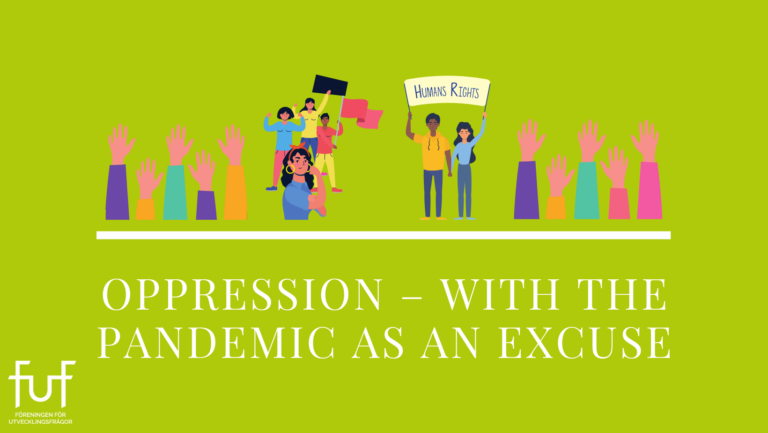How has the pandemic been handled in non-democratic and authoritarian countries?
Democracy has in many ways been put to the test during the pandemic. Over the past year due to COVID-19, social, political and economic inequalities have been highlighted around the world and the survival of democracy in some countries has been called into question.
How has access to media in totalitarian countries and the spread of information about the outside world’s handling of COVID-19 been affected? By what methods and with what motives have the restrictions been applied by the regimes? Has the pandemic been used as a reason for increased use of force against the population?
Based on these questions, FUF invites you to a discussion with Palina Kolvani, an associate researcher at the Varieties of Democracy (V-Dem) Institute based at the Department of Political Science, University of Gothenburg. She holds a Ms in Political Science from the University of Gothenburg and a BA in Political Science and International Relations and Business Administration from the American University in Bulgaria. Her research interests include democratization, autocratization and the quality of government. Prior to joining V-Dem, she worked in consulting and volunteered for the European Youth Parliament.
Palina is one of the researchers working on the Pandemic Backsliding (PanDem) Project. The PanDem project assesses the extent to which governments are violating democratic standards for emergency provisions in response to the Covid-19 pandemic. At the seminar, Palina will present the project’s latest findings from March to December 2020.
The V-Dem Institute is responsible for most activities related to data collection around the world’s democracies through the V-Dem database, but has also become increasingly active in the policy arena for democraticdevelopment. The Institute publishes research projects in the policy regarding the world’s democracies.
We will discuss how restrictions during the pandemic and/or the need for vaccines are used by authoritarian regimes to oppress and control their population. The purpose of the conversation is to highlight the role of democracy during a global pandemic and to better understand the consequences of such a crisis in non-democratic countries.
The discussion takes place via Zoom and requires pre-registration before 23:55 on the 5th of may.
The discussion is organized by FUF’s event group consisting of young volunteers.





